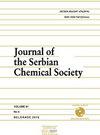PCR-based detection of alkane monooxygenase genes in the hydrocarbon and crude oil-degrading Acinetobacter strains from petroleum-contaminated soils
IF 1
4区 化学
Q4 CHEMISTRY, MULTIDISCIPLINARY
引用次数: 0
Abstract
Bacterial strains D11, E1 and E2 isolated from petroleum-contaminated soils were found to be members of Acinetobacter genus revealed by 16S rRNA gene sequence analysis and phenotypic characteristics. After incubation for 5 days, about 43%, 9% and 12% of total petroleum hydrocarbons of crude oil were degraded by strains D11, E1 and E2, respectively, determined by GC-MS analysis. Moreover, about 70% and 76% of single hydrocarbon hexadecane was degraded by the strains D11 and E1 after 3 days of short incubation time, respectively, while the strain E2 degraded about 48% of single hydrocarbon pentadecane. By using PCR-based method, gene sequences of the strains D11 and E2 were shown similarity to alkane 1-monooxygenases from Acinetobacter sp. BUU8 alkM with 93.06% and 92.72%, respectively, while the sequence similarity of strain E1 was 95.84% to Acinetobacter sp.826659. The present study of hydrocarbon biodegradation by Acinetobacter strains may provide a good advantage in bioremediation process.石油污染土壤中烃类和原油降解不动杆菌中烷烃单加氧酶基因的pcr检测
从石油污染土壤中分离到的菌株D11、E1和E2经16S rRNA基因序列分析和表型特征鉴定为不动杆菌属。培养5 d后,菌株D11、E1和E2对原油中石油烃的降解率分别为43%、9%和12%。菌株D11和E1在短时间培养3 d后,对单烃十六烷的降解率分别为70%和76%,而菌株E2对单烃十五烷的降解率为48%。菌株D11和E2与不动杆菌sp. BUU8 alkM的烷烃1-单加氧酶基因序列相似性分别为93.06%和92.72%,菌株E1与不动杆菌sp.826659的序列相似性为95.84%。目前对不动杆菌生物降解烃类的研究为生物修复工艺提供了良好的参考。
本文章由计算机程序翻译,如有差异,请以英文原文为准。
求助全文
约1分钟内获得全文
求助全文
来源期刊
CiteScore
1.80
自引率
0.00%
发文量
76
审稿时长
1 months
期刊介绍:
The Journal of the Serbian Chemical Society -JSCS (formerly Glasnik Hemijskog društva Beograd) publishes articles original papers that have not been published previously, from the fields of fundamental and applied chemistry:
Theoretical Chemistry, Organic Chemistry, Biochemistry and Biotechnology, Food Chemistry, Technology and Engineering, Inorganic Chemistry, Polymers, Analytical Chemistry, Physical Chemistry, Spectroscopy, Electrochemistry, Thermodynamics, Chemical Engineering, Textile Engineering, Materials, Ceramics, Metallurgy, Geochemistry, Environmental Chemistry, History of and Education in Chemistry.

 求助内容:
求助内容: 应助结果提醒方式:
应助结果提醒方式:


